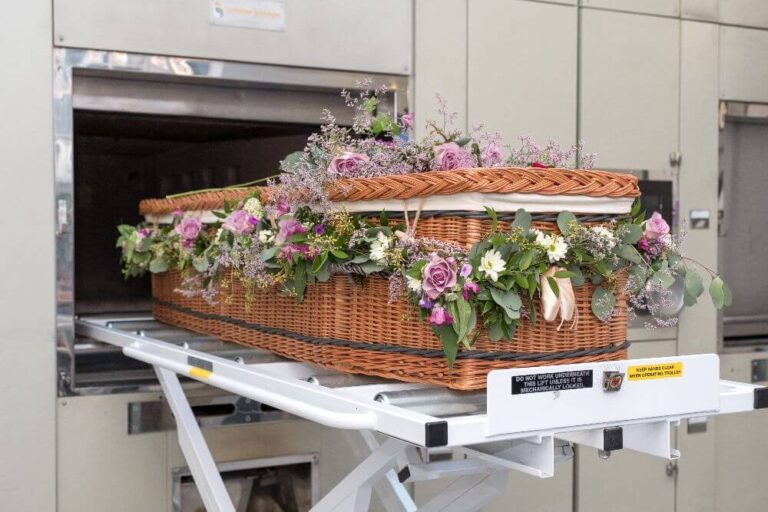The passing of a loved one is never easy, but with the right words and an understanding of how to open a funeral at home, you can pay your respects. As a funeral officiant, I’m here to provide guidance on what is expected when conducting such an important event in the comfort of your own home.
At this difficult time, it’s essential that we have patience and compassion for those who are grieving. To begin a respectful ceremony, it’s helpful to understand the key elements involved in opening a funeral at home. This includes preparing appropriate readings and prayers as well as other traditional observances like eulogies or candle lighting ceremonies.
Finally, take care to ensure everyone present feels acknowledged and included during these proceedings from immediate family members to extended relatives or even close friends. With sensitivity and consideration for all attendees, we can come together to say farewell in the most meaningful way possible.
Understanding The Necessary Legal Requirements
Gathering to commemorate the life of a beloved one is no small task. It requires a deep respect for the wishes of those who have passed, and an understanding of the necessary legal requirements that must be fulfilled in order to ensure their proper burial.
When it comes to planning funerals, funeral laws vary from state-to-state. Therefore, it’s important to research local regulations on how to file death certificates, estate planning information, and burial options before beginning any arrangements. A funeral director or attorney can help guide you through this process with ease as well.
It’s also essential to understand what is legally allowed when hosting a home funeral; however, there are ways in which families may still honor and celebrate the life of their loved ones without breaking any rules. With that said, let’s move onto selecting the right location for a home funeral.
Selecting The Right Location For A Home Funeral
When planning a home funeral, selecting the right location is essential to providing comfort and privacy for family members. The best location will be one that allows ample space for your guests while also allowing enough room around the deceased’s body so that it may be properly viewed by mourners. It is important to choose an area within your home or property which can easily accommodate all of those attending while still maintaining adequate distancing between individuals in compliance with any local regulations.
The atmosphere of the chosen location should reflect reverence and solemnity as much as possible and you may consider using candles, flowers, pictures, meaningful objects or personal items of the deceased when decorating the space. Depending on your religious beliefs, prayers or other customs may be incorporated into the service if desired. Additionally, audio services such as music or readings may be added at this point if appropriate.
It is beneficial to plan out every detail before beginning a home funeral service; from picking an appropriate location within your residence to ensuring there are enough chairs available for everyone present. As these details come together, take care not to forget even small touches like having tissues ready for those who need them during their time of mourning. Allowing plenty of time during the preparation process ensures everything runs smoothly during what will likely become an emotional experience for everyone involved…
Preparing The Deceased For Viewing
The next step in preparing for a funeral at home is to prepare the deceased for viewing. The coffin dressing and body preparation process involves embalming, cosmetics, and dressing the deceased in their chosen funeral clothing. This is a time when families can express their respect and love through clothes, jewelry or any other items that might be placed inside the casket with the loved one.
It’s important to follow all state guidelines on viewings etiquette during this time. This includes limiting physical contact with the remains of your beloved one so as not to contaminate them, maintaining social distancing among those present, avoiding loud conversations nearby, refraining from taking pictures or videos of the deceased person without permission from family members, and using masks if there are more than 10 people gathered together at once.
As we move forward honoring our departed loved one’s memory here today, let us also honor their life by keeping these practices in mind throughout our gathering. As we come together to remember and reflect upon this special individual’s life, may we find comfort in knowing they will live on through our memories forevermore.
Grieving With Family And Friends
As we gently transition from preparing the deceased for viewing to grieving with family and friends, I’d like us all to take a few moments of silence. Let us pause in this solemn moment to remember those who have passed before us, while reflecting on our own mortality and cherishing life’s precious gifts.
Our bereaved families and friends will be mourning together during this time, so it is important that we provide support and comfort as they cope with their grief. To aid them through the process, there are many traditional rituals available: holding wakes or memorial services, creating memory boards or photo albums, writing letters to the departed soul – these are just some ways in which you can honor your loved one’s legacy.
No matter what method of mourning each individual chooses, understand that everyone grieves differently. Respect their decisions if they choose not to participate in certain activities or want privacy during this period; above all else, respecting the wishes of the bereaved is paramount at funerals. As we move forward into our next section about choosing an appropriate casket or urn, let us remember that whatever path we choose when honoring our lost ones must come from a place of love.
Choosing An Appropriate Casket Or Urn
When choosing a casket or urn for your loved one, it is important to consider the size and type of memorial you are planning. Your selection should reflect the life that has been lived and how you want to keep alive their memory. Here are some things to consider when selecting a casket or urn:
- Memorial Caskets – Generally made from wood, metal, fiberboard, cardboard, plastic or other materials. Depending on your budget and preferences, there are many options available in both traditional and contemporary styles.
- Funeral Urns – There is an array of sizes and designs available in ceramic, glass, stone, bronze and other materials. These can be personalized with engravings or inscriptions that capture special memories about your loved one’s life.
- Personalization Options – Many funeral caskets and urns offer extra features like photo frames or compartments for mementos such as jewelry. You may also choose to have a custom engraved plate affixed to help commemorate the life they had led.
Your choice of a final resting place honors the individual who has passed away; use this opportunity to create something meaningful that will last forever. With these considerations in mind we turn our attention now towards developing a meaningful memorial service to pay tribute to the unique individual whose lives we celebrate today.
Developing A Meaningful Memorial Service
Now that you have decided on a casket or urn for your deceased loved one, it’s time to create a meaningful memorial service. Memorial services are an important part of honoring the life and memory of those who have passed away. Planning such a ceremony can be daunting but there are many ways to make it special and unique.
There are several options when organizing a home funeral ceremony. Consider incorporating personal elements into the service, like photos, letters or mementos of your loved one’s life that reflect their personality and accomplishments. You may also choose to include music and readings in the service as well as meaningful rituals such as scattering their ashes or planting trees in their honor.
When it comes to memorial service themes, finding something that is both appropriate yet memorable will go far in creating a fitting tribute for your beloved family member or friend. Think about what was important to them during their lifetime, whether this was religion, hobbies, travel or any other interests they had – these details can be woven into the theme of the ceremony along with any fond memories from friends and family members. This helps ensure that all aspects of their life will be honored while providing comfort during this difficult time.
As we come together today to remember our lost loved one, let us take a moment to appreciate how much love and joy they brought into our lives over the years moments which will stay with us forever. As we begin planning for burial or cremation options next, let us keep these cherished memories close at heart so that we may continue celebrating this person’s legacy even after they have gone . by cherishing the moments we shared and honoring their life through acts of kindness, we can ensure their spirit lives on.
Deciding On Burial Or Cremation Options
Opening a funeral at home can be both solemn and overwhelming. It is like stepping into the dark unknown, unsure of what lies ahead. As the funeral officiant, it is important to provide guidance on burial or cremation options while helping the family consider their funeral choices.
The first step in making these decisions is understanding all available burial options. These include traditional ground burial, above-ground mausoleums, private estates with room for multiple burials, as well as natural burials that use biodegradable materials instead of coffins or vaults. The second option is cremation; this includes scattering ashes at sea or land memorials such as parks or gardens and placing them inside an urn before burying them in a cemetery plot. Additionally, families may choose to keep some of the remains at home either by keeping them in an urn or creating jewelry from the ashes. Families should also consider whether they want to plan a memorial service right away or wait until later when more people are able to attend due to restrictions caused by COVID-19.
Estate planning is another key factor to take into consideration when deciding how best to manage final disposition of remains. This involves considering who will handle any financial obligations associated with funerals and other arrangements following death. Estate planners can help ensure that sufficient funds are available and advise families on managing assets appropriately upon death so that everyone involved receives what they need without unnecessary delays.
Managing Final Disposition Of The Remains
Managing the final disposition of a deceased loved one’s remains is an important part of arranging a funeral at home. Whether you choose to bury or cremate the body, there are several steps that need to be taken:
- Decide on a burial plan: This includes selecting a cemetery and purchasing the plot where the casket will be buried. You may also need to purchase additional items such as a grave liner, monument or marker, flowers, etc., depending on your preference.
- Make arrangements for cremation: If your family has chosen cremation rather than traditional burial, you must make arrangements with a reputable crematorium in advance to ensure proper care and handling of the deceased before and during the process. Additionally, many families like to keep some portion of their loved ones ashes either in an urn or other keepsake item.
- Consider estate planning documents: It is important to consider any legal matters pertaining to wills and other estate documents when making funeral arrangements at home. This allows everyone involved in the process from executors to family members –to understand what needs to be done in order for assets left behind by the deceased person(s) to be distributed according to their wishes stated in those documents.
By taking these steps into consideration and understanding all aspects related to managing final disposition of remains, families can begin organizing meaningful tributes while ensuring that everything goes smoothly throughout this difficult time period. The next step involves obtaining death certificates and other documents which would enable them move forward towards closure after experiencing loss
Obtaining Death Certificates And Other Documents
Now that we have discussed managing final disposition of the remains, let us move on to obtaining death certificates and other documents. It is important to understand what paperwork needs to be obtained in order for a funeral at home to take place. Death certificates are required by law so it’s best to obtain them sooner rather than later. Funeral paperwork such as cremation authorization forms will also need to be completed prior to the funeral service. Additionally, any legal documents that may need signing should also be taken care of before a funeral can occur.
It is also important to consider estate planning when having a funeral at home. Making sure that all financial matters have been accounted for and arranged prior to the service will ensure everything runs smoothly during this time of grief and loss. After death certificates and other associated funeral paperwork has been taken care of, families can then focus on arranging financial matters and estate planning for their loved one’s future.
Arranging Financial Matters And Estate Planning
John and Mary had been married for fifty years when John passed away. In their time together, they had planned ahead to ensure that the financial matters of his passing were handled properly. They arranged for all legal documents to be prepared before hand, including a will and power of attorney. This allowed them to plan out how their funeral costs would be divided among family members and other arrangements could be made in advance. As a result, when it came time for the funeral at home, there was no need to stress about who should pay for what or handle any paperwork as everything had already been taken care of.
The importance of planning ahead cannot be stressed enough; especially when it comes to estate planning. The process can seem daunting but taking steps like creating a will can help provide peace of mind knowing that your wishes are respected after you’re gone. Aside from wills, there may also be other important legal documents such as powers of attorney that should be considered if needed depending on the situation.
No matter the amount of preparation done beforehand, having an understanding of financial responsibilities is paramount whenever arranging a funeral at home. Being aware of these considerations allows loved ones to focus more fully on honoring the deceased and celebrating their life instead of worrying about money disputes down the line.
Bottom Line
Funerals are a time of grieving, but also a time to come together as family and friends. As we conclude this service, remember that the death of our loved one is not an end—it is just the beginning of their journey. It’s important to take care of ourselves during these difficult times and lean on each other for comfort and support.
We can find solace in knowing that our departed will never truly be gone if they remain alive in our memories and hearts. In the words of Ralph Waldo Emerson: “The purpose of life is not to be happy. It is to be useful, to be honorable, to be compassionate, to have it make some difference that you have lived and lived well.” May your loved one live on through all the wonderful things they accomplished in life.
As mourners today, may we strive towards living with grace and joy so that future generations will look back fondly on us as those who found peace within tragedy. Let us celebrate their life by cherishing every moment we had with them. Thank you for joining me here today; until we meet again.


